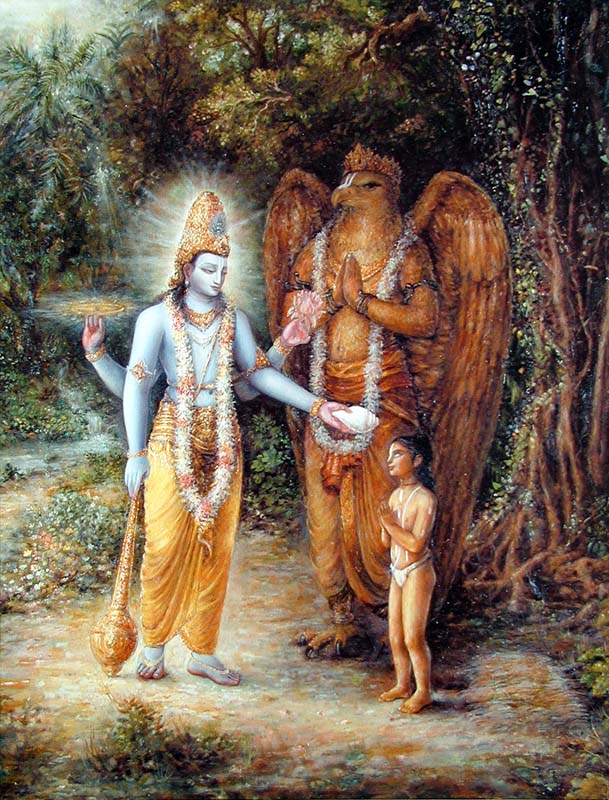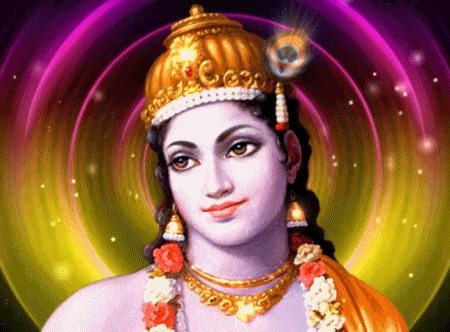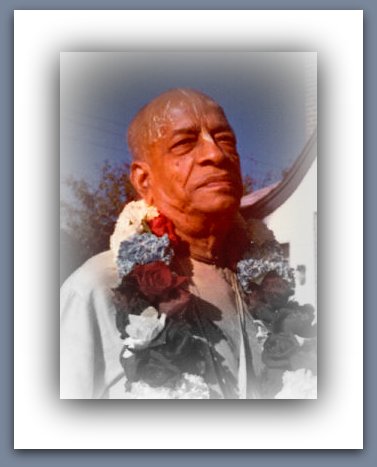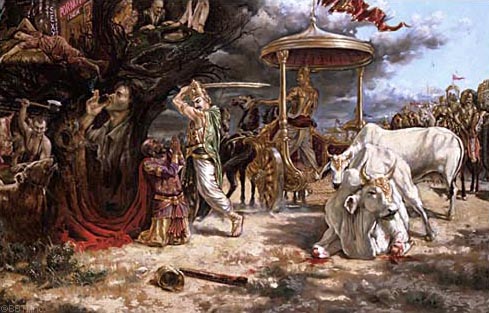
--


PURPORT
The Supreme Personality of Godhead cannot be forgotten even for a moment by His surrendered devotees. The devotee understands that the Lord's causeless mercy is beyond his estimation; he cannot know how much he is benefited by the grace of the Lord. The more a devotee engages himself in the devotional service of the Lord, the more encouragement is supplied by the energy of the Lord. In the Bhagavad-gītā the Lord says that to those who are constantly engaged in devotional service with love and affection, the Supreme Personality of Godhead gives intelligence from within, and thus they may make further progress. Being so encouraged, the devotee can never forget, at any moment, the Personality of Godhead. He always feels obliged to Him for having achieved increased power in devotional service by His grace. Saintly persons like Sanaka, Sanātana and Lord Brahmā were able to see the entire universe, by the mercy of the Lord, through knowledge of the Lord. The example is given that a person may apparently abstain from sleep all day, but as long as he is not spiritually enlightened he is actually sleeping. He may sleep at night and perform his duties in the daytime, but as long as he does not come to the platform of working in spiritual enlightenment he is considered to be always sleeping. A devotee, therefore, never forgets the benefit derived from the Lord.


O Janārdana, again please describe in detail the mystic power of Your
opulences. I am never satiated in hearing about You, for the more I
hear the more I want to taste the nectar of Your words.
A similar statement was made to Sūta Gosvāmī by the ṛṣis of
Naimiṣāraṇya, headed by Śaunaka. That statement is:
vayaṁ tu na vitṛpyāma
uttama-śloka-vikrame
yac chṛṇvatāṁ rasa-jñānāṁ
svādu svādu pade pade
"One can never be satiated even though one continuously hears the
transcendental pastimes of Kṛṣṇa, who is glorified by excellent
prayers. Those who have entered into a transcendental relationship
with Kṛṣṇa relish at every step the descriptions of the pastimes of
the Lord." (Śrīmad-Bhāgavatam 1.1.19)
Thus Arjuna is interested in hearing about Kṛṣṇa, and specifically how
He remains as the all-pervading Supreme Lord.
Now as far as amṛtam, nectar, is concerned, any narration or statement
concerning Kṛṣṇa is just like nectar. And this nectar can be perceived
by practical experience. Modern stories, fiction and histories are
different from the transcendental pastimes of the Lord in that one
will tire of hearing mundane stories but one never tires of hearing
about Kṛṣṇa. It is for this reason only that the history of the whole
universe is replete with references to the pastimes of the
incarnations of Godhead. The Purāṇas are histories of bygone ages that
relate the pastimes of the various incarnations of the Lord. In this
way the reading matter remains forever fresh, despite repeated
readings.
--
Blog: www.gloriouskrishna.blogspot.com


Dhruva Mahārāja actually experienced that upon enlightenment of his senses on the spiritual platform he could understand the essence of Vedic instruction — that the Supreme Godhead is the Supreme Person; He is not impersonal. Dhruva Mahārāja could immediately understand this fact. He was aware that for a very long time he was practically sleeping, and he felt the impetus to glorify the Lord according to the Vedic conclusion. A mundane person cannot offer any prayer or glorify the Supreme Personality of Godhead, because he has no realization of the Vedic conclusion.
When Dhruva Mahārāja, therefore, found this difference within himself, he could immediately understand that it was because of the causeless mercy of the Lord. He offered obeisances to the Lord with great respect and reverence, completely understanding that the Lord's favor was upon him. This spiritual enlivenment of Dhruva Mahārāja's senses and mind was due to the action of the internal potency of the Lord. In this verse, therefore, the word sva-dhāmnā means "by spiritual energy." Spiritual enlightenment is possible by the mercy of the spiritual energy of the Lord. The chanting of the Hare Kṛṣṇa mantra is first addressed to the spiritual energy of the Lord, Hare. This spiritual energy acts when a living entity fully surrenders and accepts his position as an eternal servitor. When a person places himself at the disposal or order of the Supreme Lord, that is called sevonmukha; at that time the spiritual energy gradually reveals the Lord to him.
PURPORT
There are different stages of perfection according to different
persons' objectives. Generally people are karmīs, for they engage in
activities of sense gratification. Above the karmīs are the jñānīs,
who are trying to become liberated from material entanglement. Yogīs
are still more advanced because they meditate on the lotus feet of the
Supreme Personality of Godhead. And above all these are the devotees,
who simply engage in the transcendental loving service of the Lord;
they are situated seriously on the topmost platform of ecstasy.
Here Dhruva Mahārāja is advised that if he has no desire for sense
gratification, then he should directly engage himself in the
transcendental loving service of the Lord. The path of apavarga, or
liberation, begins from the stage called mokṣa. ln this verse the
word vimuktaye, "for liberation," is especially mentioned. If one
wants to he happy within this material world, he may aspire to go to
the different material planetary systems where there is a higher
standard of sense gratification, but real mokṣa, or liberation, is
performed without any such desire. This is explained in the
Bhakti-rasāmṛta-sindhu by the term anyābhilāṣitā-śūnyam [Madhya
19.167], "without desire for material sense gratification." For
persons who are still inclined to enjoy material life in different
stages or on different planets, the stage of liberation in bhakti-yoga
is not recommended. Only persons who are completely free from the
contamination of sense gratification can execute bhakti-yoga, or the
process of devotional service, very purely. The activities on the path
of apavarga up to the stages of dharma, artha and kāma are meant for
sense gratification, but when one comes to the stage of mokṣa, the
impersonalist liberation, the practitioner wants to merge into the
existence of the Supreme. But that is also sense gratification. When
one goes above the stage of liberation, however, he at once becomes
one of the associates of the Lord to render transcendental loving
service. That is technically called vimukti. For this specific vimukti
liberation, Nārada Muni recommends that one directly engage himself in
devotional service.
Srimad Bhagavatam 4.8.61












